Albert Henry Newman: A Life of Learning, Faith, and Legacy
Albert Henry Newman was a man of contrasts—a scholar whose love for books was only matched by his dedication to his faith and the quiet, enduring influence he left on countless students and fellow academics. Born on August 25, 1852, in the Edgefield District of South Carolina, Newman was the eldest son of John Blackstone Newman and Harriet Whitaker Newman. It’s said he learned to read by the age of three, an early marker of his intellectual fervor. Public schools were scarce, and so young Albert’s education relied on private tutors—often local pastors who imbued their lessons with moral weight as much as academic discipline.
The Civil War uprooted the Newman family, and they found themselves in Thomson, Georgia, at the end of that dark chapter in American history. Here, Albert came under the mentorship of Reverend Epenatus Alexis Steed, whose influence would open the gates to Mercer University for Albert. Under Steed’s tutelage, Albert entered Mercer as a junior in September 1869—an uncommon feat for a seventeen-year-old—and graduated first in his class just two years later. It was a start that foreshadowed the many scholarly heights he would reach, driven by an insatiable hunger for knowledge.
A Path Forged in Faith and Scholarship
Albert Henry Newman’s journey from small-town South Carolina to a figure of reverence in theological circles is marked by a mix of tenacity and intellectual curiosity. After graduating from Mercer, Newman spent a year teaching elementary school, but his heart longed for more academic pursuits. In 1872, he enrolled at Rochester Baptist Theological Seminary in New York, a place where his interests took flight. Specializing in Hebrew and the exegesis of the Old Testament, Newman emerged in 1875 with a reputation for scholarly intensity.
Newman had aspirations to study further in Germany—a mecca for theological scholarship at the time. Instead, he found himself at the Southern Baptist Theological Seminary in Greenville, South Carolina, where he studied the Old and New Testaments under eminent scholars like Crawford Howell Toy and John Albert Broadus. Newman’s penchant for ancient languages and scriptural texts took hold here, forming the core of a career that would span five decades and influence generations of theologians.
Academic titles followed, reflecting both Newman’s erudition and his devotion to his field. He was awarded an honorary Doctor of Divinity (D.D.) by Mercer in 1885, an honorary LL.D. by Southwestern Baptist University in 1883, and numerous accolades in the years to come. His teaching career began at Rochester Baptist Theological Seminary, where he held a professorial role in church history from 1877 to 1881. From there, his journey took him to McMaster University in Toronto, and Baylor University in Texas, where he made significant contributions to theological education.
A Legacy of Teaching and Writing
Newman’s teaching career was punctuated by his time at Toronto Baptist College—later McMaster University—where he served from 1881 to 1901. Here, he became known for his rigorous standards, deep historical insight, and his ability to breathe new life into the study of church history. He also left his mark on Baylor University and Southwestern Baptist Theological Seminary, where he collaborated with Benajah Harvey Carroll to establish a theology department that, by 1907, became its own entity.
But it was perhaps as a writer that Newman left his most indelible mark. He authored hundreds of articles, filling journals, encyclopedias, and periodicals with his thorough and discerning analyses. His major works, such as A History of Anti-Pedobaptism (1897), A History of the Baptist Churches in the United States (1894), and A Manual of Church History (published in two volumes between 1899 and 1902), were comprehensive, influential, and served as cornerstones for Baptist historical studies for decades. His writing was characterized by its scrupulous accuracy, an attribute that earned him both acclaim and respect.
Newman was known for his willingness to challenge prevailing historical views, particularly in his work on the Anabaptists. He depicted them in a more favorable light than many of his contemporaries had, reshaping the historical understanding of their role in early Christian history. His scholarship offered a fresh lens through which to view the development of the Baptist church, one that emphasized grace, complexity, and human resilience.
The Algernon Sydney Sullivan Award
In 1927, at a ceremony that was equal parts stately and touching, Albert Henry Newman was presented with the very first Algernon Sydney Sullivan Award at Mercer University. The award, established by the New York Southern Society, recognized individuals who exemplified “fine spiritual qualities practically applied to daily living.” It wasn’t just Newman’s scholarly work that made him an ideal recipient; it was his character—quiet, steadfast, and grounded in service—that truly set him apart.
As Mercer celebrates the centennial of this prestigious honor, we are reminded of the enduring impact of Newman’s life and contributions. According to Dr. Rufus W. Weaver, then-president of Mercer, the Sullivan medallion recognized “a high spiritual standard applied to life in ways that mattered.” Dr. Weaver continued, “Albert Henry Newman, fifty-six years ago you received at the hands of the president of Mercer University the degree of A.B. You were a member of the first class to graduate after Mercer removed to this city. For over fifty years you have taught church history. No other man in America has made a like record of uninterrupted service.” For Newman, this was reflected in his tireless dedication to theological education, his ability to inspire countless students, and his commitment to using his intellect for the common good.
Though by nature he was unassuming, Newman’s influence was profound. He was described as shy, often retreating to the background, preferring the company of books and the solace of quiet study over public accolades. Yet those who knew him spoke of his genuine warmth and humility, qualities that were as impactful as his academic work. It is fitting that Newman would be the first to receive an award honoring spiritual qualities brought to life, as his entire career exemplified those very ideals.
As Dr. Frederick Eby, Newman’s son-in-law, once said, “He was a man who combined a high mind and a humble nature—always eager to assist anyone who sought his knowledge, yet never seeking attention for himself.” Such reflections from those close to him reveal a man who embodied both wisdom and grace.
Steve McDavid, president of the Sullivan Foundation, remarked on the historical significance of Newman’s award: “The presentation of the Sullivan Award to Albert Henry Newman in 1927 was not just a recognition of his scholarship but a profound acknowledgment of his life lived in service to others. As we celebrate one hundred years of honoring those who demonstrate the finest of spiritual qualities, we reflect on Newman’s legacy—a legacy that reminds us all of the enduring power of humility and intellect put to noble purpose.”
A Life Beyond the Classroom
Newman’s legacy isn’t only held within the pages of his books or the lecture halls where he taught. It is also deeply personal—rooted in the relationships he fostered with his students and the quiet, steady presence he maintained in their lives. He married Mary Augusta Ware in 1873, and together they raised four children. His love for his family was evident in the way he spoke of them, and upon his retirement in 1929, Newman moved to Austin, Texas, to live with his daughter and son-in-law, Dr. Frederick Eby. His later years were filled with quiet reflection and the company of loved ones until his death in 1933, following an accident.
His work and his gentle demeanor left an impression on all who crossed paths with him. Even after his formal retirement, Newman continued to teach, write, and share his vast knowledge of church history. For him, the pursuit of understanding and the sharing of that understanding were lifelong endeavors. His devotion to teaching, whether through his writing or his lectures, remained unwavering until the very end.
A Lasting Impact
As we reflect on the century since Albert Henry Newman received the first Algernon Sydney Sullivan Award, his legacy continues to serve as a beacon of inspiration. Newman’s life was a testament to the power of humility, intellectual rigor, and the quiet pursuit of one’s passions in the service of others. His dedication to faith, scholarship, and humanity’s collective good sets a high standard for those who follow in his footsteps.
Through his teachings, writings, and the way he lived his life, Albert Henry Newman embodied the values that the Sullivan Award was created to honor. His story speaks to the transformative power of education, the importance of humility, and the value of intellectual inquiry—not for personal gain, but for the betterment of society. As Mercer University and the Algernon Sydney Sullivan Foundation celebrate this milestone, they also celebrate the enduring legacy of a man who lived those values every day.
Sources
- Mercer University Libraries. (n.d.). Albert Henry Newman Biography. Retrieved from Mercer University website: https://libraries.mercer.edu/ursa/handle/10898/11612
- Texas State Historical Association. (n.d.). Albert Henry Newman. Retrieved from https://www.tshaonline.org/handbook/entries/newman-albert-henry
- Kutilek, D. (2014, October 24). Albert Henry Newman. The Tribune. Retrieved from https://www.tribune.org/albert-henry-newman/
Back to all News items.


